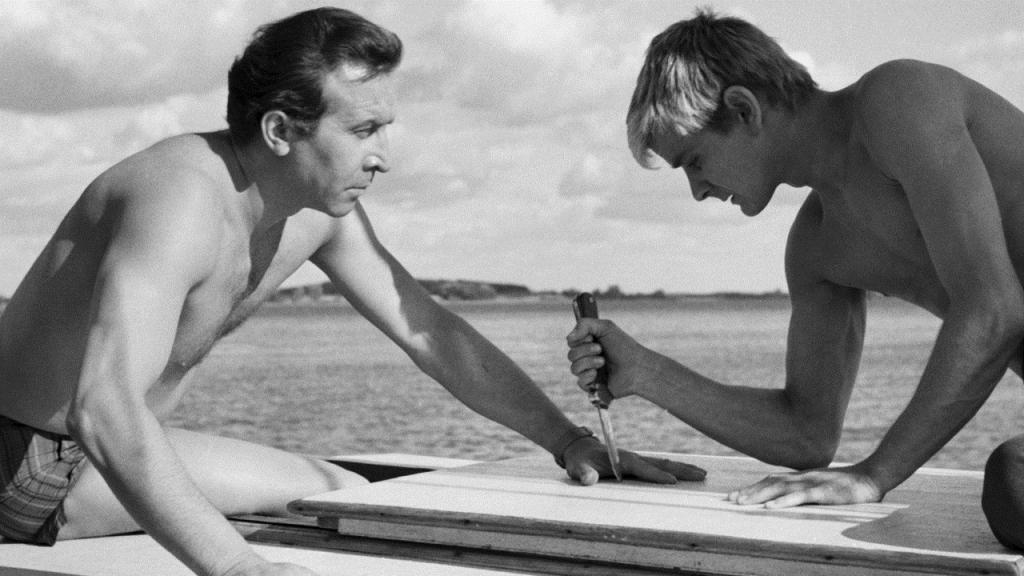Yes, best film for me - I can watch it always. Would say that The Magnificent Ambersons’s first seventy or so minutes are superior and am convinced that Welles’ DC would’ve been a better film than Kane, but the chances of that cut ever getting recovered seems almost nil after this length of time…
[size=12pt]Knife in the water/Nóz w wodzie [/size] - 1962 - Roman Polansky
[url]Photobucket | The safer way to store your photosI still remember the first time I’ve seen Knife in the water still a teen, in one of those great directors special week, that our public TV had back then the good taste to present the tax payers. This was the first films of the five days, and they presented films like “Chinatown” “Cul de Sac” and other great works, but it was Knife in the water that stayed in my mind for long at the time.
It was Polansky first long feature, and at first it just seems like an odd nonsensical pretentious art house films. Nothing is more wrong, it’s quite the opposite, Knife in the water it’s an ambiguous tale about sexual tension, full of symbolisms that leave the viewer searching for answers instead of giving definitive answers.
It’s a simple story, a middle age sports writer and his younger wife travel to their usual 24h yacht trip, while still traveling by car, the wife almost runs over a young student passing by. After this event they decide to invite the student (we never get to know his name) on the trip, what follows is a game of cat and mouse, or better saying old cat new cat, but not in the usual way.
Polansky with three characters, little dialogue and filming in the same location, was able to create a unique films in terms of building tension. I’ve read that the characters are an allegory to a communist society under which the film was made, subtle but still an allegory, with the older man representing the communist society well establish strong on their position, while the young student represents the new generation fighting to take over the old one, with the wife waiting to follow a winner. Maybe so, but to be honest I still follow my first instinct about this film since the first view, the sexual tension, it’s all about the woman and sex, the power struggle very basic stuff. But once again Polanski plays with the viewer showing how beautiful the woman is, but not giving us nothing more than tension, and in the end nothing really happens.
Actually there’s no blood no physical violence only tension being build. In a way Kubrick tried to make a similar thing in Eyes wide Shut, with and by other means of course.
The actors did more than OK and are well inside the spirit of the film, the cinematography is fantastic and so the camera movements following the actors from the most unexpected angles.
It’s a great film, of course not the most obvious one, but it’s intense as few thrillers are psychological ones or not.
The quality of Knife in the water if present if not by other things in its atemporal feeling. For those who like cinema this one is most watch from time to time.

Straight Time (1978) w/Dustin Hoffman
I’m not sure why I hadn’t seen this until now. A very fine film with a good Dustin Hoffman playing a recently ex-con who tries (although not very hard) to make good, but falls back to his old ways and worse. Some good supporting performances by Harry Dean Stanton and especially M.Emmet Walsh as the nasty parole officer and there’s also a barely recognizable Kathy Bates in this too. Gritty and realistic, a good film for sure.
[quote author=Lone Gringo link=topic=2183.msg170683#msg170683 date=1414090386]

Straight Time (1978) w/Dustin Hoffman
I’m not sure why I hadn’t seen this until now.
[/quote
My thoughts exactly when I first saw Straight Time. I think was Ennio who said, from a time when Hoffman did interesting movies.
Yeah, he did make some interesting movies.
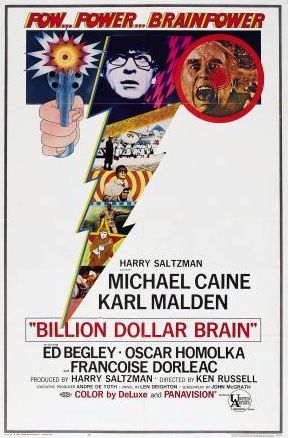
Billion Dollar Brain (Russell/67)
“Billion Dollar Brain” (1967), directed by the iconoclastic Ken Russell, in the 1970s a firebrand of British cinema. This was the third and final Harry Palmer spy film, following “The IPCRESS File” (1965) and “Funeral in Berlin” (1966), based on Len Deighton’s popular novels, Palmer had been pitched as an anti-James Bond. Michael Caine as the bespectacled and cockney hero was certainly far away from the suave glamour of Sean Connery’s Bond movies and seemed to inhabit a recognisable Swinging Sixties London. Yet after the dour realities of the previous two films, which are closer to le Carré than Ian Fleming, Russell makes a spy film that is as much a parody of the genre as it is a thriller.
Caine looks consistently bemused by the intrigues and betrayals after encountering his old friend Leo Newbigen (an excellent Karl Malden who conveys his character’s unease and unreliability). Once Midwinter’s plot emerges (Ed Begley who overacts outrageously), the entire facade of the film threatens to crumble. Russell constantly undercuts our expectations: the Soviet authorities, represented by a faintly ridiculous Oskar Homolka, are seen as essentially reasonable and as keen as MI5 to avert World War Three, while Midwinter’s base, run by a giant computer that is coordinating his plan, is so over the top that it could be production designer Syd Cain commenting on his own work for “From Russia with Love” (1963). Russell extends the none-too-serious tone with Caine getting beaten up and knocked out more than everyone else and the entire climax is a replication of Sergei Eisenstein’s “Alexander Nevsky” (1938) ending, with its battle on a frozen lake. There’s no denying the skill with which Russell directs the whole farrago, particularly the scenes with Caine stumbling across the frozen Finnish landscapes, benefiting enormously from shooting on location.
Other treats are Billy William’s elegant cinematography, the entire title sequence with its elaborate computer motifs and Richard Rodney Bennett’s thundering, highly romantic piano score, borrowing liberally from Rachmaninoff and Stravinsky, strangely fitting the action on screen and helps maintain the tension when it seems as if Russell is engaged with other tangents such as the subplot of Françoise Dorléac and her ambiguous relationship with Karl Malden. The film as a consequence, isn’t brilliant, its energies dissipated by too many digressions, but “Billion Dollar Brain” still provides a lot of entertainment, partly as it playfully rejects so many of the clichés of the genre that it’s nominally a part of.
Did you watch the new Blu Ray?
No, sadly, but from an appalling fullscreen version being broadcast on TV. The BD though, judging by the screencaps, ([url]http://www.blu-ray.com/movies/Billion-Dollar-Brain-Blu-ray/107997/[/url]), doesn’t look as good it should either, with nefarious edge enhancement and seems to be struck from a dated source.
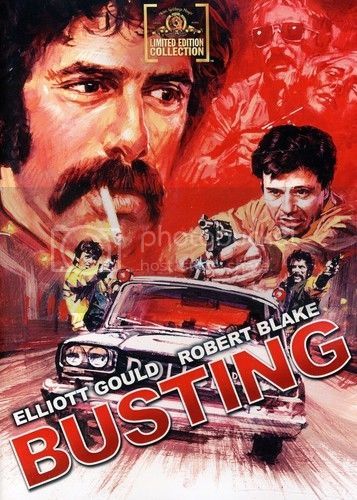 [url]Photobucket | The safer way to store your photos
[url]Photobucket | The safer way to store your photos
Busting - 1974 Peter Hyams
My first viewing of this after many years, and it was fantastic. Gould and Blake are great together, with some interesting camera work for some of the scenes. Underrated, but well worth the wait for the Warner Archive release. Seeing it again in better widescreen quality was a godsend. I managed to dig out the elusive soundtrack for this which I bought quite some time ago. The score was done by Billy Goldenberg, better known for his music on Kojak. A gritty, depressing film, which works quite well with the bleak look of the locations, busy crowded markets, dingy street corners, and to top it all off, an chase involving two old amubulances,(Ghostbuster style ones) tearing up the streets and smashing each other senseless. A great piece of 70’s gritty crime drama which I highly recommend to anyone else who likes 70’s “gangster vs cops” films.
Also, check out “The Outfit” with Robert Duvall and Joe Don Baker, as another 70’s “gang warfare” film.
Yes great stuff that one…right up my street so to speak  .
.
[quote=“Farmer_J, post:11929, topic:1923”]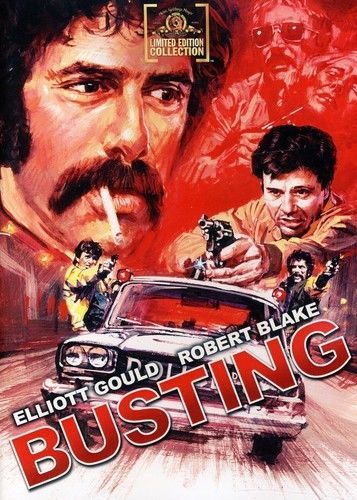 [url]Photobucket | The safer way to store your photos
[url]Photobucket | The safer way to store your photos
Busting - 1974 Peter Hyams
My first viewing of this after many years, and it was fantastic. Gould and Blake are great together, with some interesting camera work for some of the scenes. Underrated, but well worth the wait for the Warner Archive release. Seeing it again in better widescreen quality was a godsend. I managed to dig out the elusive soundtrack for this which I bought quite some time ago. The score was done by Billy Goldenberg, better known for his music on Kojak. A gritty, depressing film, which works quite well with the bleak look of the locations, busy crowded markets, dingy street corners, and to top it all off, an chase involving two old amubulances,(Ghostbuster style ones) tearing up the streets and smashing each other senseless. A great piece of 70’s gritty crime drama which I highly recommend to anyone else who likes 70’s “gangster vs cops” films.
Also, check out “The Outfit” with Robert Duvall and Joe Don Baker, as another 70’s “gang warfare” film.[/quote]
I fucking love this film, a 70’s buddy cop movie just the way I like them, with plenty of non PC comments. Gould and Blake make a great team.
I hope Twilight Time or Kino put it out on Blu (it being on MGM archive already makes no difference to that as some of them have come out licenced on blu or are coming out already)
I’ve got that CD too, my favourite tracks are the Supermarket chase ones and the one where Sid Haig is in the titty bar. Shame it never came out back on vinyl back in the day.
Oh, and Peter Hyams is one of my favourite U.S. directors. ![]()
Its become one of my top 20 movies of all time, just the soundtrack and the dialogue are fantastic together, I liked the “Chase” music piece. A great low budget thriller, that does not need any special effects, just two pissed off guys, gangsters, and everyone in between. I’d have to say, the market shootout is my choice for the best scene.
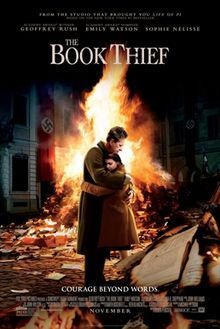
The Book Thief (Percival/13)
“The Book Thief” (2013), the début film of Brian Percival, who previously directed episodes of TV shows like “Downton Abbey” and “North & South”, is adapted from the 2005 novel by Markus Zusak. In its telling of a coming-of-age story of a young girl, growing up in Hitler’s Germany during World War Two, the film works amiably enough. Certainly, Percival elicits fine performances from his cast, particularly Nélisse as the precocious heroine, Rush as the kindly surrogate father and Watson playing the frosty mother. They provide an emotional centre that’s crucial to the picture’s success and while their characters are never as sketched-in as one would hope, the capable actors allow the audience to identify and empathise with them as they undergo wartime trials and tribulations.
For a first feature film, Percival brings an eye for the small-scale from television; despite taking place in a limited location (mainly the Heaven Street where Liesel lives), he avoids any feeling of constraint. He crafts a slow rhythm to the life of Liesel that’s appropriate for the small town it’s set-in, a commendable illusion of verisimilitude immeasurably aided by Florian Ballhaus’ cinematography. The wide-angle shots of snowy landscapes and dramatic red-and-white swastika flags all contribute to grounding the movie in the atmosphere of its specific epoch.
However, the film suffers from a number of different elements. The rather arch conceit of having Death narrate the movie (voiced by Roger Allam), while it might work on the printed-page, seems out of place and ultimately places a comfortable distance between us and the tragedies on screen. In particular, the sugar-coating of its downbeat ending removes any real pain, leaving only a vague pathos. This is compounded by John William’s Oscar-nominated score, redolent of his soundtrack for “Schindler’s List” (1993), and in its heavy emphasis on string instruments, blatently attempts to emotionally manipulate the viewer and push the sentimentality to the extent that it feels forced and un-earned.
So many clichés, from stiff Nazi villains to the triumphant message of the power of reading, are prsented unquestioningly, as po-faced as possible and without the saving grace of irony. This is fundamentally a gentle film; the horrors of war are delicately kept out of the way and even when the family is apparently starving, Liesel looks the epitome of a healthy young child. If taken on its own terms and in a receptive mood, “The Book Thief” plays well enough, but its lack of any bite means that it will likely grow hazy in memory.
Dead in tombstone…Danny Trejo is one of my fav “tough guys” but I was disappointed with this when saw 1st time on January. Now I liked it more.
‘Horror Of Dracula’ (1958)
-Christopher Lee, Peter Cushing
Phantoms Review: classic
[quote=“John Welles, post:11933, topic:1923”]
The Book Thief (Percival/13)[/quote]
Excellent writing John. The film seems to be what I feared it was, and therefore I have avoided it so far.
Still might give it a chance, maybe around Christmas. Looks like one of those movies that work better with some bells jingling.
City of The Living Dead.
The gates of hell must be closed or else bad things will happen…well they did anyway  . But our heroes try their best, but this a Fulci film so loads of negative waves going on. Its the grim atmosphere I love in this one to that pounding score, punctuated by some classic gore moments
. But our heroes try their best, but this a Fulci film so loads of negative waves going on. Its the grim atmosphere I love in this one to that pounding score, punctuated by some classic gore moments
[quote=“scherpschutter, post:11936, topic:1923”]Excellent writing John. The film seems to be what I feared it was, and therefore I have avoided it so far.
Still might give it a chance, maybe around Christmas. Looks like one of those movies that work better with some bells jingling.[/quote]
Thanks - this was a “family” film so didn’t have much choice about watching it; probably better viewing though than a bland children’s animation.
@ ENNIOO:
Classic zombie Fulci, even if it does verge on incoherence. Have to say that so far, Don’t Torture a Duckling is my favourite of his, over and above his horror efforts.
The Deadliest Prey (2013).
Ted Prior is back kicking arse in the follow up to the first film from the 80’s. Good cheesy fun that does not pretend to be anything it is not. Some really funny lines in the film, and Prior still looks good.
‘Psycho’(1960)
-Anthony Perkins
Phantoms Review: Masterpiece
